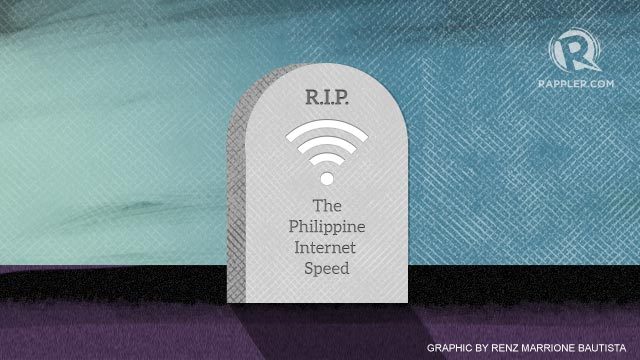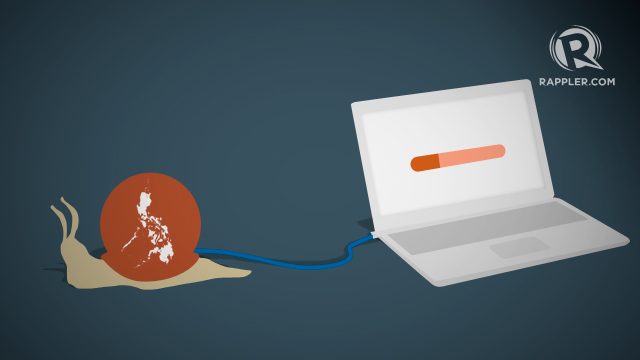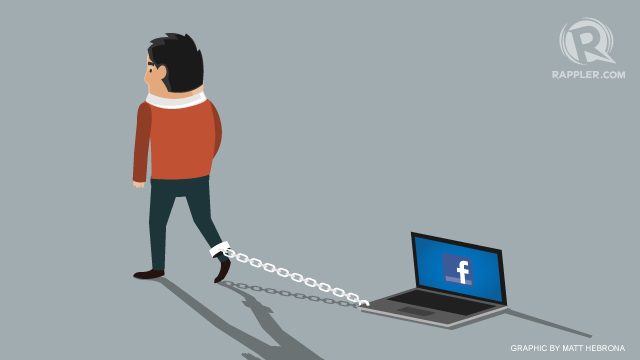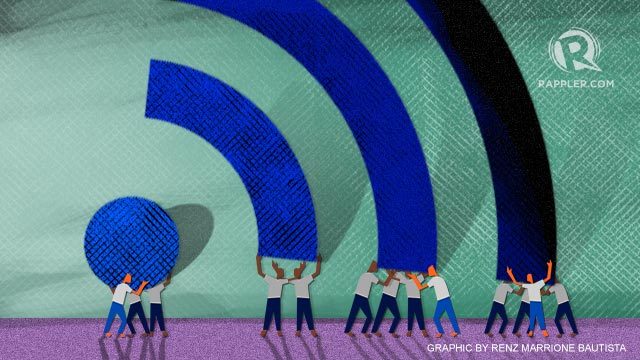SUMMARY
This is AI generated summarization, which may have errors. For context, always refer to the full article.

MANILA, Philippines –The state of the Philippine Internet is lackluster compared to quite a number of other countries in the world, partly because of a costly speed-to-price differential and partly because our speeds do not stack up to the global average.
Based on a number of different analyses of Internet speeds, it can be said that we have an average Internet speed of anywhere from 2.0 to 3.6 Megabits per second (Mbps). Information from Ookla’s NetIndex study of mobile data speeds shows that the Philippines has an average of 3.9 Mbps in that sector.
These, however, are seen as the top average speeds for Internet connectivity, and the reality is we all get speeds lower than advertised. Why is the Internet in the Philippines the way it is?
I had a talk with Bayani Lara, Supervising Science Research Specialist at the Department of Science and Technology’s Advance Science and Technology Institute (DOST-ASTI) and part of the team that runs the Philippine Open Internet Exchange (PHOpenIX).
I asked for his thoughts on why the country’s Internet is slow, how IP Peering works, and what can be done to improve the Philippines’ Internet speeds. I came away with the realization that there isn’t an easy fix to the situation the country’s in.

Internet slowness and the 1:1 ratio
Lara referred to the May 28 Senate hearing when it came time to discuss why the Internet is slow. According to the Senate hearing, “basically what they’re saying is (there’s) oversubscription and congestion.”
Dissecting that answer, we first come across the issue of determining oversubscription in the country. Lara explained that it was difficult to get data from telecommunications companies and the National Telecommunications Commission (NTC) to get an objective view of the situation. As a result, the observations Lara and his team can make only come from analyzing the networks themselves relative to general use.
According to Lara, one observation was that people – and companies – get what they pay for. By this, he explained that “businesses, since they pay for very expansive leased lines, they really get the 1:1 ratio of connectivity.”
This ratio, he explained, relates to the speed going from your home or office modem to the service provider, and then from the service provider going out to the intended site or destination. While most of the speeds going from homes or businesses to the service provider tend to be the same, the difference lies in the second bit: the path from provider to the intended destination.
What happens is that those who pay more – such as businesses – get a faster connection going out from the service provider to the intended site or destination, while those who pay less used shared infrastructure for the same purpose. The shared infrastructure tends to have more people and is thus slower as a result.
While this particular issue is, he said, “tolerated to some extent” in other countries, Lara thought the issue of oversubscription may need to be looked into. While he noted there was a level of acceptable oversubscription due to the ebb and flow of people using the Internet at different times, when you get past a certain level of oversubscription the overall service degrades.

IP peering in the Philippines
Our discussion then turned to an issue that Globe is in favor of yet Smart is against: IP peering.
IP peering is when two networks exchange traffic with each other freely, benefiting both parties in terms of improved performance, better capacity for handling large amounts of traffic, or a host of other possible benefits. The discussion of IP peering has spawned a Change.org petition as well, urging PLDT to agree on IP peering.
In my discussion with Lara, he laymanized it by saying that IP peering keeps the local exchange of traffic within the borders of the country. He explained it by imagining an email exchange between two people on networks that don’t peer with each other.
“For example,” he explained, “if you’re on a Globe connection and you want to send an email to a PLDT connection, they don’t connect with each other. They don’t peer with each other.”
“What will happen is that your email through your Globe ISP will go out of the country.” He explained that it might route somewhere, whether it be Singapore or Hongkong or some other country. He added that it will then find its way to PLDT, then will use PLDT’s network to get back to your friend.
Lara explained that this route is very expensive, takes longer to get the email to the other person, and that some of the costs may get thrown back to consumers.
When it came time to the issue of why PLDT and Globe were in disagreement about IP peering, he felt there was a misunderstanding somewhere.
Based on the press releases given by the companies, Lara felt the parties aren’t saying everything. “What the big company is saying – our number one telco – is that it will give undue advantage to the smaller networks.”
What the second largest telco and other smaller players are saying, according to Lara, is that they support IP peering because it makes the local network faster.
IP peering, Internet exchanges, and speed
Lara first discussed the argument of those supporting IP peering. One thing that IP peering encourages, he noted, was local content – sites or services such as news websites, e-commerce sites, and other Philippine-based websites.
If a central Internet exchange was in place where telecoms companies, Internet service providers, and local and foreign companies could all link up and peer with each other, this would mean faster connectivity to most sites and services with less overall cost to many companies.
Companies and individuals in the Philippines would host their sites or services in the Philippines because it would be faster. Foreign companies, such as Yahoo, Facebook, or Google, would also post local caches in the country to make sites or services load faster.
The problem with a lack of IP peering is that foreign companies don’t have a centralized place to post caches that will affect everyone, forcing them to either host multiple caches at a larger overall expense, choose one company over another to give uneven caching coverage, or ignore the Philippines entirely as a destination for caches.
The undue advantage
Going back to the issue of undue advantage for smaller networks, Lara noted the concerns of larger networks, saying that smaller players such as local ISPs would be able to take advantage of the infrastructure set in place by PLDT without much benefit to PLDT itself.
The issue with this reasoning, however, is that there isn’t much of an alternative as a result of the duopoly between PLDT-slash-Smart and Globe. One extreme would be that a small, local ISP would try to build his own nationwide infrastructure just for this purpose.
Lara then juxtaposed this with an earlier statement he remembered during the days when PLDT bought Digitel. He noted an earlier stance of PLDT, saying that a smaller number of players are needed in the country so finite resources – such as the wireless spectrum to deliver 3G, LTE, and other signals – would be better used.
“They [PLDT in this case] don’t want the smaller guys to ride settlement-free over their infra[structure], and they also don’t want these smaller guys to build their own infra.” Their alternative, Lara posits, is that smaller players should pay to use PLDT’s infrastructure. Globe, however, doesn’t want to do that when there is a more viable alternative available: peering and competing properly.
The remaining option is the current state of the Internet in the Philippines: a lack of IP peering.
“Bottom line,” Lara explained, “we cannot stay in the status quo where the network exchange between the local networks is going out of the country. If their answer is that they have no alternative, that can’t be, because it’s the users who suffer.”

An Internet Exchange as neutral ground
What’s a middle ground that can be drawn? Lara mentioned the existence of the DOST-ASTI’s Internet exchange as well as a number of other exchanges in Manila.
A neutral Internet exchange, whether it be the PHOpenIX or some other exchange like that of PLDT, Globe, Eastern Telecom or another party, is a potential alternative that can be raised, so long as companies and the major players in the IT industry decide to pick one and run with it.
The main issue with this, however, is that there is a lot of profit to be made from having the Philippines’ main Internet exchange, and no one wants to give in and allow someone else to reap the profits. A successful, well-connected Internet exchange will generate a lot of money from companies joining and installing their tech as part of the exchange and paying for maintenance and upkeep.
One way to get around this is to run the Internet Exchange as a not-for-profit solution – and therefore a non-competitor in the market – to the country’s Internet woes. Another potential solution is if the different companies decided to link their Internet exchanges together as a neutral ground for interconnection, with a board to run it and keep it separate from the for-profit activities of the various companies.
In both cases, management of such an exchange is also a concern, and with competing interests at play among companies, there is a trust issue as well since one company would be put over another on the exchange.
While the DOST is offering to be the neutral monitor and manager, there’s also the possibility of making the configurations on the Internet exchange available to all the members of the exchange so fair treatment can easily be checked and monitored.
There is also the matter of security and logistical concerns in terms of telecoms-grade setups, and that’s something the DOST-ASTI has little control over with its own budget; DOST-ASTI’s own exchange is made from donated equipment at no cost to them.
To that end, Lara suggested having the players pool resources and discuss fees for membership, with the fees and pooled resources serving as the budget for the exchange to pay for redundancies and security, among others.
Internet diplomacy
There isn’t a simple solution to improving the Internet. What I used to think was a perennially technical concern also came to be a very human, political effort.
While we have a regulatory body for monitoring telecommunications companies – the NTC – there is little they can do in terms of making sure that standards are upheld.
For instance, assuming a minimum speed for Internet connectivity was mandated by turning the Internet into a basic service, it would need to be up to the companies and consumers – with the diplomatic efforts of organizations and the NTC – to ensure that the speed people ask for is within the technical capabilities of companies but not so low as to be a non-starter for consumers who want reliable, speedy connectivity.
NTC Director Edgardo Cabarios admitted Tuesday, June 10, that NTC doesn’t have the equipment to check telecoms companies’ Internet speed. This adds difficulties in assessing how the Internet can be improved and what base minimum speed can serve as a standard for the country moving forward.
Sadly, I don’t have any answers of my own. This is less of a technical hurdle as it is an Internet diplomacy problem.
For issues of diplomacy and politics, there needs to be a concerted effort from multiple sectors to solve the issue in a calm, rational fashion. Otherwise, what you see now is all we’re ever going to get moving forward. – Rappler.com
Add a comment
How does this make you feel?





There are no comments yet. Add your comment to start the conversation.